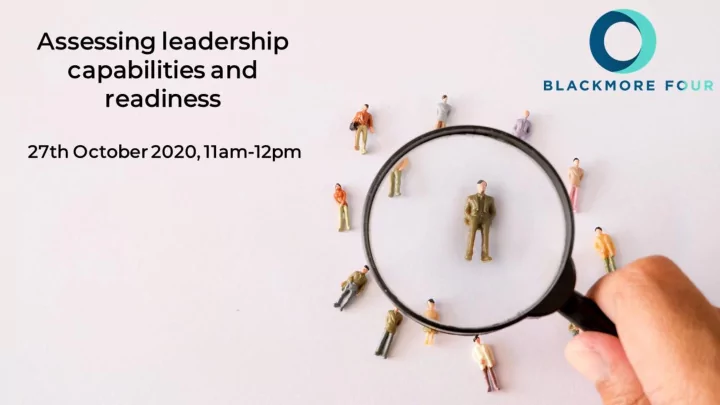

What is Leadership? ‘a distinct set of capabilities and behaviours that determine and drive the purpose, values and direction of the organisation’
Agenda: 1. Leadership and Leadership Needs 2. Principles of Leadership Assessment 3. Methods of Assessment 4. Assessing Leadership Readiness
What is Leadership? ‘A distinct set of capabilities and behaviours that determine and drive the purpose, values and direction of the organisation’
Leadership is… CONTEXTUAL: Leadership happens in context; it is not independent of its environment or circumstances. RELATIONAL: Leadership involves influencing the behaviour of others and for that to happen there needs to be some element of relational activity. ANCHORED TO A DESTINATION: The art and science of leading people has a fundamental implication that you are leading or being led somewhere. A SHARED PROCESS OF INSPIRING ACTION: We believe leadership is also about a shared process of action and reaction.
It is a set of skills and behaviours that are developed and deployed between leaders and followers, available to everyone regardless of their designated role, experience or personal disposition and subject to tests of relevance and impact as business needs change.
Leadership Needs Analysis (LNA) ‘A critical component’
What is Leadership? ‘a distinct set of capabilities and behaviours that determine and drive the purpose, values and direction of the organisation’
Leadership assessments should be based on a common set of principles To be effective, assessments must be: OBJECTIVE and conducted in a way that is fair and free from bias Consistently producing RELIABLE results you can depend on Generating VALID data against the items you are trying to assess
1.INTERVIEW 2.TEST 3.FOCUS GROUPS 4.OBSERVATION Let’s look closer
1. An interview Less widely used for conducting leadership assessments. Interview techniques are helpful in assessing leadership style. Use structured interviews
2. A test Psychometric assessment - Cognitive abilities - Personality - Emotional intelligence Misapplication of psychometric tests leaves us questioning their validity Using the right test can provide powerful, complementary insight Identify the right tests to use
3. Focus groups Where surveys fail, focus groups facilitate Feedback, energy and clarification Requires specific (usually independent) facilitation skills Collect objective data
4. Observation See for yourself Leadership tends to happen when you least expect it Spending time in the natural company of leaders Opportunity to see how they really do it – context rich
Assessing Leadership What is Leadership? Readiness ‘a distinct set of capabilities and behaviours that determine and drive the purpose, values and 1. Leading, but not ready for the future? direction of the organisation’ 2. Leading, but not aligned? 3. Leading, but not recognised? 4. Not leading, but might have potential?
Leadership skills and behaviours play a critical role in any organisation Start by identifying the specific attributes that are relevant for your own business. Important for assessment to be conducted fairly… …in a manner that promotes participation… …rather than judging, isolating or labelling individuals Leadership is a team sport…
Why is this relevant? • • If you have some form of team If you consider leadership to be a structure then we think it is critical attribute of your organisation important that the structure is fit for then we think it is important that you purpose, providing tangible and consider what leadership skills and identifiable relationships between behaviours are likely to be effective in different parts of the organisation. driving the purpose, values and direction of the organisation • • If you consider the skills and If you have developed processes or behaviours of your employees to be implemented systems to enable to the a significant contribution to your functioning of your business then we success then we think it is important think it’s important that they are right for to define your specific requirements what you are trying to achieve and and ensure you are collectively facilitate MORE VALUE out of your team effective in how you operate. rather than increase bureaucracy or stifle That is creativity. Organisational Effectiveness
Questions? 01277 575 604 contact@blackmorefour.co.uk www.blackmorefour.co.uk
Recommend
More recommend